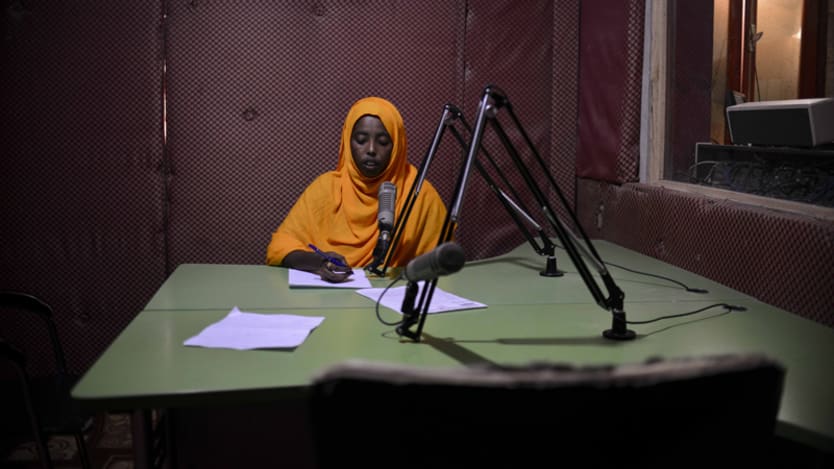Strong, independent media critical for good governance

Do not envy U.S. Agency for International Development Administrator Gayle Smith, who recently took the helm of one of the world’s largest development organizations. Violent extremism is on the rise. The largest number of refugees since World War II are fleeing intractable wars in the Middle East, Africa, Central America and elsewhere. Humanitarian crises caused by droughts and natural disasters are likely to persist. Widespread corruption continues, undermining the legitimacy of governments. Over a billion people still live in extreme poverty.
Emergencies like these, coupled with tight budgets, make it tempting to cut into investments that do not relieve immediate human suffering. Yet, as Smith surely recognizes, USAID must also invest in core institutional development if we want to move from transactional to transformational development assistance. USAID must invest in the conditions that enable sustainable, accountable and locally led development.
We argue that strengthening independent media and access to trustworthy information is one of the most important conditions for enabling all other development activities to succeed. Healthy media contributes to good governance and better, more responsive, and more effective development outcomes. USAID should refocus its efforts on strengthening media after years of dwindling funding.
In our experience working in some of the most challenging environments in the world — from closed societies to conflict zones to humanitarian crises — people need trusted information to understand the world around them, engage in conversations with their communities and their leaders, make decisions, and act to improve their lives. Strong independent media is critical to effective, responsive and transparent governance. It disseminates important information and represents people’s opinions and needs to decision-makers. It is also the foundation for strong markets and economic growth.
“Trusted, local information forms the cornerstone of civic discussion; it promotes transparent and accountable institutions; it informs choices during crisis, and it empowers societies to find inclusive, sustainable solutions to their own development challenges.”
— Internews President Jeanne Bourgault and IREX CEO Kristin LordAllow us to share just two examples of how support for media can make a difference:
In the context of the refugee crisis in Europe, information offers one of the most basic forms of aid. The lack of current, local information puts these vulnerable populations even more at risk from kidnappers, traffickers and smugglers. Misinformation puts them in the wrong place at the wrong time and they get involved in riots or stampedes.
While much has been made of the use of smartphones by the current wave of refugees, these high tech tools are useless without good, local information that answers specific questions using language people can understand such as: how do I get to the registration center? Where can I find medical support? To help solve this issue, Internews has pioneered a solution called News That Moves, a multilanguage content service drawing from stringers along the route and pushed out to the affected populations both online (apps and portals) and offline (leaflets and flyers).
In Ukraine, divisive information from dubious sources has exacerbated ethnic tensions, contributed to conflict in the eastern part of the country, and challenged the government’s reform agenda. To address this challenge, IREX provides hands-on training in critical thinking and media analysis skills for media institutions, media leaders, communities, and citizens so that they can recognize fact-based reporting when presented with contradictory information from both Ukrainian and Russian-language media.
The ultimate goal of this type of work is to build information-savvy societies that both produce reliable information and discern the trustworthiness of the information they encounter. We have found that once citizens are equipped with skills to identify biased reporting, unreliable sources, and hate speech, their appetite for truthful reporting — and their ability to find it — increases. Citizens learn to avoid manipulation, and they can more effectively pressure their government to act responsibly.
Administrator Smith will have a powerful impact on the lives of many people around the world during her tenure. To amplify that impact, we recommend increasing support for the professionalization of journalism (including investigative reporting and data journalism), media business management, multimedia production and internet freedom. Support for media literacy is needed to ensure that citizens seek out and produce trusted information.
Community media (from radio to locally created news apps), last mile infrastructure to ensure that communities have the means to access information, and well-implemented laws that protect and ensure people’s right to information are all critical. USAID should also increase support to information aid during moments of crisis, to ensure that other forms of humanitarian aid do not go to waste. A commitment to strengthening independent media and good local information, even in the most challenging of conditions, will empower citizens to drive their own development in the long term.
USAID has long been a leader in building the capacity for communities to produce independent media and locally trusted information and we urge Smith and other development leaders to build on this foundation. Our organizations’ experience over the past three decades — much of it in partnership with USAID — provides ample evidence that strengthening the production and exchange of local information is critical for addressing key development challenges at their foundations.
Join the Devex community and access more in-depth analysis, breaking news and business advice — and a host of other services — on international development, humanitarian aid and global health.
Search for articles
Most Read
- 1
- 2
- 3
- 4
- 5









